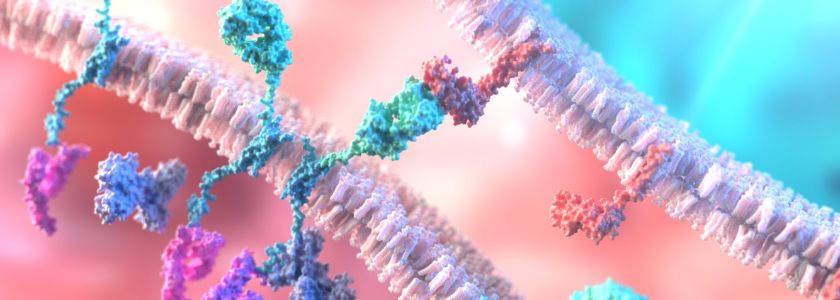The future of CAR T: where we’re going and how CRISPR can help us get there

The Takeaway: Since its inception in the late 1980s, CAR T cell therapy has undergone continuous refinement and improvement. Advances in chimeric antigen receptor (CAR) design, manufacturing techniques, and supportive care have helped overcome some of the challenges associated with this treatment, such as cytokine release syndrome and neurotoxicity. However, there are still limitations, including the high cost of treatment, logistical complexities, and the need for further research to optimize its effectiveness and applicability across different cancer types.
CAR T cells are living drugs that fight cancer by identifying and binding to cancer-indicating proteins, called antigens, on cancer cells. This binding triggers a response that leads to the destruction of the cancer cells through the patient’s own immune system. In this process, there are numerous components that can be modulated to improve the specificity, persistence, and potency of the CAR T cell to better harness the curative potential of this technology.
Over the last 30 years, CAR T cell therapy has undergone continuous refinement in design, manufacturing techniques, and supportive care. However, there are still limitations. The high cost of treatment, logistical complexities, and the need for individualized treatment for each patient are all factors that prevent CAR T from being more widely adopted. The need for these therapies is growing rapidly, especially for the treatment of chemo- and radiation therapy-resistant cancers. Scientists and physicians are striving to provide solutions that would make CAR therapy the standard of care for cancer patients. In particular, CRISPR is applied for genome engineering to make genetic changes that improve the underlying mechanisms for how CARs function.
CRISPR is advancing CAR T therapy
Here are three ways that CRISPR is helping make the next generation of CAR therapies:
- Multispecific antigen sensing: CAR T cells targeting CD19, an antigen found in lymphomas and leukemias, represent the majority of clinical trials utilizing CAR technology. However, targeting CD19 alone is not enough for a cancer patient to have long-lasting remission. Using CRISPR for multi-targeted precision genome engineering, scientists can engineer multispecific CAR T cells that respond to multiple antigens simultaneously. For example, a CAR T cell can be engineered to target either CD19 or an alternative antigen for broader cancer cell recognition. Additionally, CAR T cells can be engineered to recognize both CD19 and another antigen for tighter regulation of recognition for specific cancer signatures. This multispecific sensing can be developed further to include an inhibitory CAR for CAR T cells that recognize CD19, but the presence of another specified antigen (like a protein found on normal cells) shuts down the pathway that leads to destruction of that cell. These multispecific antigen-sensing CAR T cells improve specificity and reduce undesirable side effects from treatment.
- Off-the-shelf CAR T cell therapies: CAR T therapy in its current state must be highly personalized for each patient to avoid triggering an immune response. A universal CAR T product would be easier to produce and administer to multiple patients but is currently unrealizable due to the complex nature of the human immune system. Scientists are working to address this gap by showing how CRISPR can be used to disrupt expression of specific elements of the CAR T cells that signal a host’s immune system to mount a response against foreign cells. These “hypoimmune” CAR T cells can evade a patient’s immune response and persist in the patient longer, making them more effective and more widely applicable to multiple patients. Moreover, hypoimmune CAR T cells could be produced on a large scale and administered to multiple patients without having to custom-make a treatment for each patient. A broadly-applicable “off-the-shelf” universal CAR T product could revolutionize the modern approach to cancer therapy.
- CAR NK: CARs can be expressed by other cell types besides T cells. Typically, T cells recognize an antigen and activate a cascade of cellular events that recruit cells like natural killer (NK) cells, neutrophils, and macrophages to destroy that cell. The next generation of CAR therapies include skipping the cascade and instead expressing the CAR directly on the cell that destroys the cancer cells. NK cells are a desirable alternative because of their natural ability to recognize antigen, lower the risk of immune response, and penetrate solid tumors. The lowered risk of immune rejection also means that NK cells have the potential for re-dosing a patient for a more thorough therapy. Similar to how CRISPR is used to edit T cells to make CAR T cells, scientists can use CRISPR to edit genes in NKs that are involved in immune checkpoints, cytokine signaling, and other factors that affect the behavior and effectiveness of CAR cells.
The ability to make large quantities of universal, hypoimmune CAR products with improved specificity and efficacy could improve treatment availability for more cancer patients. Clinical trials are underway that will usher in the next generation of CAR therapy. With scientists and physicians working together to use CRISPR genome editing to solve the shortcomings of the current technology, the future of these therapies is even brighter.
